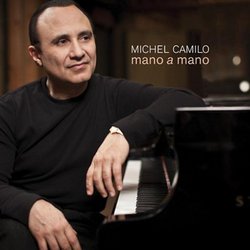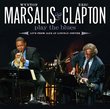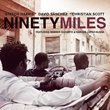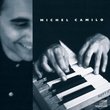| All Artists: Michele Camilo Title: Mano A Mano Members Wishing: 1 Total Copies: 0 Label: Emarcy / Pgd Original Release Date: 1/1/2011 Re-Release Date: 9/13/2011 Genres: Jazz, Pop Style: Number of Discs: 1 SwapaCD Credits: 1 UPC: 602527658131 |
Search - Michele Camilo :: Mano A Mano
 | Michele Camilo Mano A Mano Genres: Jazz, Pop
The opening track of Dominican pianist and composer Michel Camilo's dazzling new release, Mano a Mano as he joins the Decca/EmArcy (Universal Music Group), is not only a scene setter but a declaration of principle. Optimis... more » |
Larger Image |
CD Details
Synopsis
Product Description
The opening track of Dominican pianist and composer Michel Camilo's dazzling new release, Mano a Mano as he joins the Decca/EmArcy (Universal Music Group), is not only a scene setter but a declaration of principle. Optimistic, brimming with energy and understated virtuosity, "Yes," an original composition by Michel, hints at the sound of classic Cubop while celebrating modern Afro-Caribbean jazz. "'Yes' is a positive piece," says Michel. "It's an affirmation. It's saying that getting involved in this music, in this project, has been all worthwhile. The piece is in the mold of a 'Donna Lee,' or an 'Indiana,' and it was a way for us to say 'Yes, we know the jazz tradition. But we also know something else. And here there are two traditions.'" In Mano a Mano, Michel Camilo, returns to one of his most effective settings, the trio, but with a twist, using congas and small percussion, instead of trap drums. Featuring longtime friends, master conguero Giovanni Hidalgo and bassist Charles Flores, Michel's trio creates a lighter, more open sound, still powerful, yet also with a certain sweet mango-flavored lyricism that proves to be a perfect vehicle for a wide ranging repertoire that includes eight original compositions and three standards. It's a recording that speaks of an artist reaching maturity, connecting personal and professional moments of his past with a fresh, clear vision of the future. But it all started, however, on a chance encounter. "In June 2010 there was a celebration of the 20th anniversary of the Heineken Jazz Festival in Puerto Rico and the organizers invited back all the living 'highlights' in the history of the festival," recalls Michel. " I appeared with my trio, but as part of the event I was asked to also prepare a number for the festival's big band which could eventually become a great descarga (Latin-style jam session). I loved the idea and was already thinking about inviting Giovanni to join us, thinking of when we recorded One More Once (1995) And sure enough, it became a great jam ... but at one point, the band stopped and Giovanni and I were left playing as a duo and it reminded me of when we did Hands of Rhythm, 15 years ago, and I thought 'Hang on now, there is something here.'" The idea of a possible duet album quickly evolved into a trio date. "I thought about it and realized that I had done a duo record. It was better to move on," explains Michel. And knowing the players, he knew it was a chance for something truly special. Giovanni Hidalgo is a "very mindful player, and very musical," he says. "He is a one of a kind conguero. He doesn't only hear rhythm but melody and harmony. For this recording he used five and six congas, and he tunes them to certain pitches and creates a scale. There is nothing random about it, it's well thought out, and that helped the melodies and harmonies." And for Mano a Mano, Michel, wearing the producer's hat, also asked Giovanni to play smaller percussion, something that has rarely been asked of him. The result is a subtly shaded tapestry of sound that adds colors and textures to the music. Meanwhile Charles Flores, Michel's long time collaborator, was the obvious choice on the bass."Charles has been with me for awhile now, I've seen him grow to become a tremendous bass player," offers Michel. "He not only has a great technique but also a great harmonic concept and this sense of space, of economy, in the Charlie Haden tradition." He says Hidalgo's and Flores's playing give him a "a great latitude of touch." Michel says his experiences playing in European classical music settings, performing standard repertoire and his own piano concertos as a soloist with symphony orchestras in the US, Europe, Asia and the Caribbean, have made him a subtler, better pianist. Now, with this trio, he is able to "caress the keys, control the attack, the dynamics." Moreover, the group represents not only a "meeting of the minds, each one of us with a rich musical baggage and our own rhythmic notions" but also, considering Michel is Dominican, Giovanni Puerto Rican, and Charles Cuban, the coming together of three potent Afro-Caribbean musical traditions. "I knew it was going to be a good combination," he says. With this trio in mind, Michel wrote the original music in the span of one week, last December. "It was a surreal experience," he recalls. "It was as if everything was ready and it was only a matter of sitting down and letting it flow out. It was truly magical." He also decided to include three standards, two from the jazz tradition, the other one a Latin American classic - Lee Morgan's "The Sidewinder," John Coltrane's "Naima," and Ariel Ramírez's "Alfonsina y el Mar." Musically, it's a demanding repertoire that cuts a wide swath. It includes Latin jazz barnburners (such as "Yes," and the title track) but also a nod to the sound of boogaloo and the 1960s Latin soul ("The Sidewinder"); a samba-choro ("No Left Turn"), and a sly, neo-traditional rumba ("Rumba Pa'Ti"). Moreover, in Mano a Mano, Michel explores two essential popular styles from the Dominican Republic. His take on bachata, a kind of ballad, results in the exquisite "You and Me," which Michel calls "a bachata in black tie." While in "Rice and Beans," he reworks merengue, a two-step dance style. It's a first for Michel. "I played it at a rehearsal, just for kicks, as a lark, and everybody jumped in 'Yes, yes, let's do that one.' So it stuck. It's actually merengue-jazz. It's in the merengue tradition (and you can feel the typical quintillo, a five-note rhythmic figure, throughout the piece) -- but with the type of harmonic changes you find in jazz." And just as this trio can groove and dance, "Alfonsina y El Mar," a song from the Great Latin American Songbook made famous by the late singer Mercedes Sosa, gets here a thoughtful, smart "three-way intimate conversation." It's not by chance. For Michel, Mano a Mano underscores the fact that Latin jazz "is not just a continuous jam session. Yes, we can bring high energy when it's called for, but we also can be subtle when we need to be."
Similar CDs
| Clarke Corea & White Forever Genres: Jazz, Pop Label: Concord Records | |
| David Sanchez, Stefon Harris, Christian Scott Ninety Miles Genres: Jazz, Pop Label: Concord Picante | |
| Spyro Gyra A Foreign Affair Genres: Jazz, Pop Label: AMHERST RECORDS | |
| Michel Camilo Michel Camilo Genres: Jazz, Pop, Latin Music Label: Sbme Special Mkts. | |

 Track Listings (11) - Disc #1
Track Listings (11) - Disc #1



